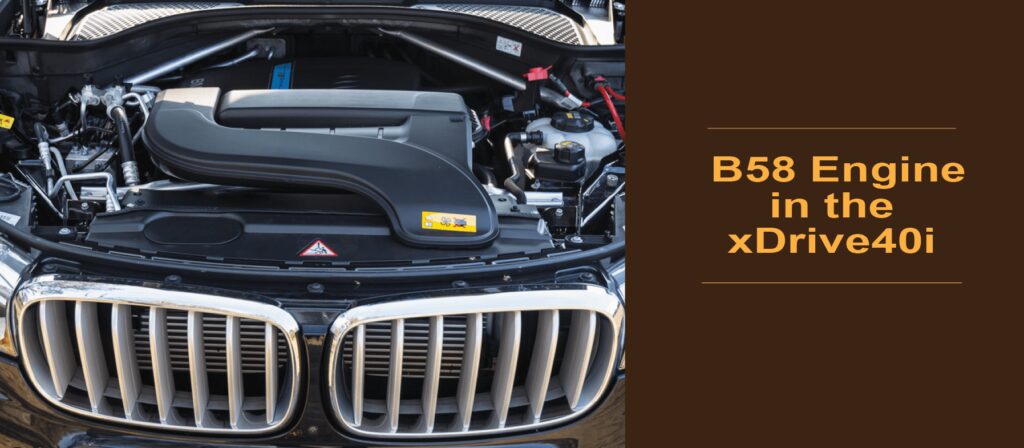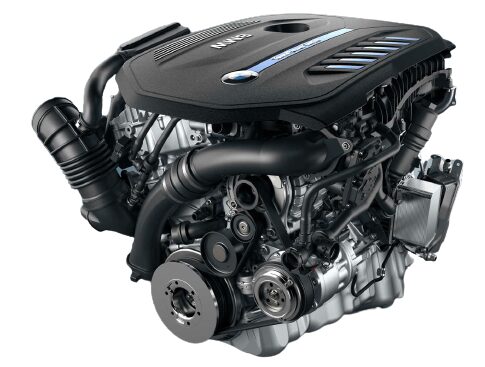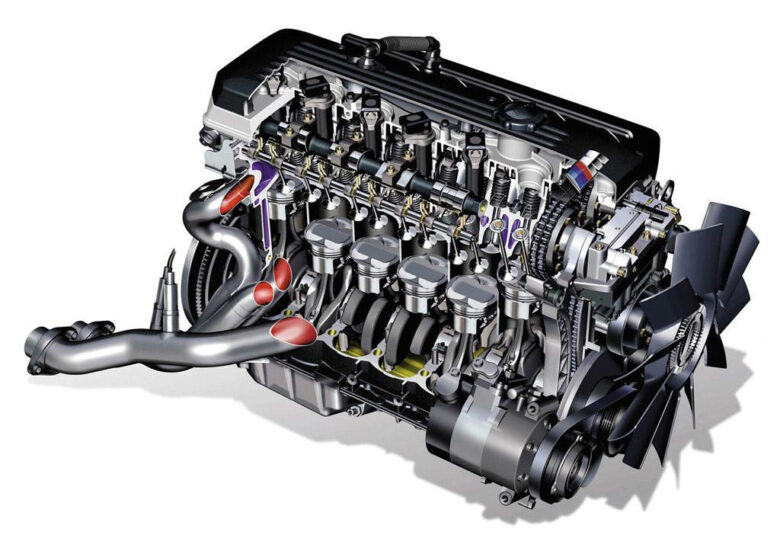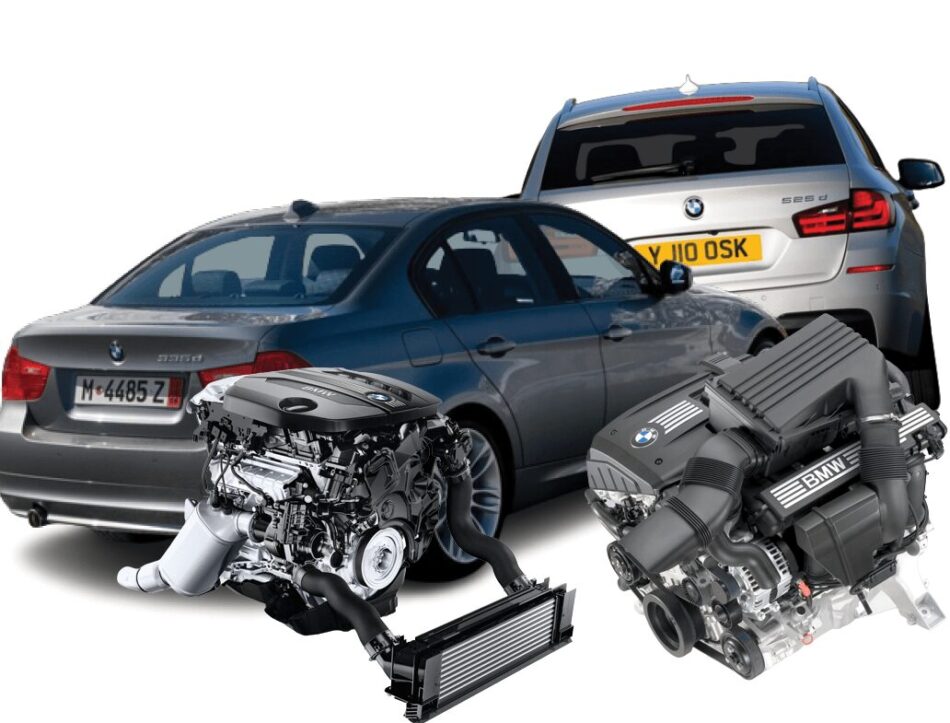The Heart of the Beast: Most reliable BMW X5 ENGINE

Most BMWs prioritize luxury and performance. The luxury is undeniable, as is the performance, particularly in the BMW X5. However, BMW X5 reliability is a mixed bag of emotions.
That serves as the foundation for our discussion of the most reliable BMW X5 engine, as we delve into the performance vs reliability of various BMW X5 models based on production years.
To remain competitive in the luxury SUV market over the years, the X5 has undergone continuous updates. The X5 is offered in several trim levels, each of which has its own set of features and performance abilities.
Based on the year of manufacture, we’ll group the options into the first, second, third, and fourth generations of the BMW X5 and assess each for your assistance.
Let’s discuss the BMW X5 engine reliability…
First Generation BMW X5
The first generation BMW X5 was produced from 1999 to 2006. The engine options for this generation X5 included:-
Reliable BMW X5 ENGINE - M54
This engine was offered in the BMW X5 E53 from 1999 to 2003. It was widely praised for being extremely fuel efficient for a 6-cylinder engine. At 16 mpg city and 22 mpg highway, that wasn’t too bad for a high-performance engine.
Notable Features Of the M54 Engine

- Electronic throttle control to ensure a smooth and precise throttle response
- The engine block and cylinder head are made of aluminum, which helped to keep the engine lightweight and improve the power-to-weight ratio.
- High-pressure fuel injection to improve combustion and reduce emissions.
- Good power output of 228 horsepower and 221 lb-ft of torque, providing a good balance of power and fuel efficiency.
- The engine was a gasoline powerplant
M54 Engine reliability
It is difficult to detect problems in a new engine until it has been tried and tested by real users. Factory tests are seldom adequate.
While new, the M54 was picking awards left right, and center but soon the issues surfaced. Issues you should expect with this engine include:
- Valve cover gasket leaks
- Cooling system issues due to a failing water pump
- Oil filter housing gasket leak
- High-pressure fuel pump failure can cause the engine to stall or not start at all
- Ignition coils failure can cause the engine to misfire or not start
- Water Pump and thermostat failure which happens to be a common BMW engine problem
- Vanos failure is typically caused by worn-out piston seals
Are those problems tolerable on a new-to-you vehicle? It all depends on your desire to get your hands filthy as well as the elasticity of your wallet.
BMW x5 series using m54 engine
The E53 BMW X5 made between 1999 – 2003 running on gas has the M54 under the hood.
Verdict
Some individuals believe you can keep the E53 running with the M54 engine, but let’s face it: the issues listed above are difficult to overlook and could ruin your ownership experience.

Reliable BMW X5 Engine - M57
The M57 was not just powerful but also efficient in terms of fuel consumption. It was designed using a common-rail diesel injection system and a variable geometry turbocharger, making it a small monster buried beneath the hood of the X5.
The aluminum block of the M57 housed a forged-steel crankshaft and forged-steel connecting rods, allowing the engine to manage significant torque. The M57 is the epitome of BMW X5 engine performance. Depending on the version, torque might reach 500Nm.
Most notable features of the M57 Engine
The M57 was advanced on every metric and by featuring robust features it was a fantastic engine. Some of the features included:-
- Low noise and vibration for a more comfortable driving experience
- Twin-turbocharger for enhanced performance
- High-pressure injection common-rail diesel injection system for precise fuel injection and improved engine efficiency
- Aluminum engine block to optimize the engine for performance and fuel economy
- Advanced cooling system
M57 Engine reliability
The M57 engine was one of the best engines that BMW ever made but a couple of issues to be aware of include:-
- High-pressure fuel pump failure
- Turbocharger failures
- Emissions control system errors
The M57 might face the same difficulties as any contemporary diesel engine. These include carbon buildup, EGR failure, and glow plug failures, particularly for high-mileage automobiles.
Regular upkeep and timely response to any problems can assist to ensure the M57 engine’s dependability and longevity.
In our opinion, the issues mentioned above do not present a significant problem. Continue reading to find out if the BMW X5 engine is reliable.
BMW X5 series using M57 engine
The E53 diesel option made between 2000 to 2006 runs on the M57 engine.
Verdict
This is a reliable engine, and for an astounding ten or more years, BMW paired it with several other models across its product line. The M57 engine on the BMW X5 should be handled carefully as a used car purchase.
You will certainly run into the issues mentioned above. If you already have the E53, this is probably nothing new to you.

Second Generation BMW X5
In 2006, the second-generation BMW X5 hit the market. The E70 BMW X5 offered more features, specifications, and performance than the E53 BMW X5.
BMW had to step up their game in the engine sector to ensure that the previous generation’s faults were rectified and all of the excellent characteristics were improved.
The N52 and N55 engines were available for the second-generation BMW X5. Because our approach is primarily concerned with dependability, both engines are nearly equal in terms of performance and dependability. We’ll focus on the N52 as we search for the most dependable BMW X5 engine.
Reliable BMW X5 Engine- N52
The M54 engine was replaced by this straight-six gasoline engine in 2004. The engine was naturally aspirated. The BMW X5 was not equipped with this engine until 2006 in the E70 X5 BMW. Overall, the N52 engine was created to strike a compromise between performance and fuel efficiency.
It incorporates several modern technologies that aid in increasing power output and fuel efficiency.
Most notable features of the N52 Engine

The N52 engine is a well-engineered powertrain that offers performance and fuel efficiency overall. Some of the notable features include:-
- Valvetronic variable valve lift to adjust the amount of lift on the intake valves for better power output and fuel efficiency
- Double VANOS variable valve timing
- Electric water pump to improve the engine’s warm-up time
- Magnesium engine block is designed to improve the power-to-weight ratio and fuel efficiency
- Direct fuel injection
- High-pressure fuel pump to help increase the engine’s fuel pressure, improving fuel efficiency and power output.
N52 Engine reliability
On the N52, reliability is a mixed bag of lemons and candy. The Achilles heel of the N52 is the gremlins – additional technology. The N52 engine has been cited for a few widespread problems.
The high-pressure fuel pump is one of the most frequent problems, and when it malfunctions, the engine can lose power or stall. This problem is caused by a damaged fuel pressure sensor, and it can be fixed by either the sensor or the fuel pump.
Low oil pressure and oil leakage are two more prevalent problems with engines’ oil systems. The solution to this problem is to replace the oil seals and gaskets.
The timing chain on the N52 engine has a history of stretching with use, which can lead to timing problems and misfires. A persistent check engine light on the dashboard is another thing to anticipate. It is advised to check the timing chain and replace it as necessary.
In addition to these issues you should expect problems with the:-
- Ignitions coils
- Vanos
- Ignitions coils
- Oil filter housing gasket
- Valve cover
- Coolant hose failure
- Catalytic Converters
BMW X5 series using N52 engine
The X5 was produced between 2006 and 2010 as the E70 X5 BMW 3.0si and the xDrive30i has the N52 engine.
Verdict
You’re likely to have a negative experience with the N52 given the plethora of issues mentioned above.

Third Generation BMW X5
In 2013, the third iteration of the BMW X5 was released. The 3.0-liter turbocharged inline-6 (N55 engine), the 4.4-liter turbocharged V8 (N63 engine), and the 3.0-liter diesel turbocharged inline-6 are the available engines in this generation (N57 engine).
On the third generation analysis, let’s merge the 3-liter gasoline and diesel engines.
N55 and N57 Engines
The N55 engine was available in the xDrive35i and xDrive40e trim levels. The engine is both powerful and efficient, which contributes to a smooth and refined ride.
The N57 was paired with the BMW X5 xDrive35d and xDrive40d.
Both engines are high-performance machines that will need proper care and maintenance to maintain their durability and dependability.
Compared to the N57 engine, the N55 engine is thought to be more dependable and has fewer documented problems. Issues are still prevalent. Sadly, the N55 is a total dud.
Over time, you are likely to detest this engine with issues such as high oil consumption, cooling, high-pressure fuel pumps, and turbocharger failures.
On the other side, the N57 is praised for its exceptional fuel efficiency. In any case, the engine is a 3.0 liter inline-6 turbocharged diesel. A noteworthy feature of fuel efficiency is the engine’s common rail direct injection technology.
The N57 engine has similar faults to its N55 sibling, such as high fuel pump troubles and turbocharger failures. Timing chain breakdown, abnormal oil usage, and extra issues with diesel engines such as carbon buildup and DPF issues.
Should you choose this engine?
Read on for the group verdict below…
The N63 engine
The N63 engine, which was available in the xDrive50i and xDrive50d versions, increases power and performance significantly.
Most notable features of the The N63 engine

The N63 is a performance beast. We’re looking at a 4.4-liter V8 engine with a twin-turbocharged system capable of producing up to 600 horsepower.
- TwinPower Turbo technology
- High Precision Injection with piezo injectors that can vary the fuel pressure for better fuel efficiency and emissions.
- Valvetronic technology allows the engine to adjust the timing and duration of the valve lift
- Direct fuel injection
- VANOS system
The N63 engine reliability
A high-performance engine is prone to a slew of issues, and the N63 is no exception.
- Timing chain problems:
- High-pressure fuel pump failure
- Valve stem seal leaks
- Oil filter housing gasket leaks
Verdict
The engines in the third-generation BMW X5 (F15) produced from 2014 to 2019 are great on performance. But since we are here to discuss reliability, our opinion on all three engines is…

Fourth Generation BMW X5 (2018-current)
The BMW X5 is currently in its fourth generation, with a variety of engine options to meet a variety of demands and preferences. The engines include
- B58 engine – 3.0L turbocharged inline-6
- N63 engine – 4.4L turbocharged V8
- B57 engine – 3.0L turbocharged diesel inline-6
Let’s stick to the theme – and look at the most dependable of the three. After highlighting the shortcomings of the N63 engine in the previous generation, we are left with two engine alternatives.
Let’s find out the capabilities of each of them…
Reliable BMW X5 Engine- B58
BMW’s pursuit of performance and fuel efficiency has always resulted in success. However, one important feature remained elusive for almost all BMW products – reliability.
The savior of the BMW brand was introduced in this BMW X5. The B58 has found a place in the list of the most reliable engines. Despite being in production since 2015, this engine was first used in the BMW X5 series in 2018. By then, all issues should have been identified and remedied. The first positive indicator making this one of the best BMW X5 engines.
It is safe to say that the B58 has restored BMW’s reputation for reliability. But what characteristics did it have…
Most notable features of the B58 Engine

The materials used in the engine block and cylinder heads could indicate a weak and unreliable engine or a long-lasting motor.
BMW also needed to put a stop to the cooling problems on prior models. On this engine, they addressed these concerns by including the following features:
- High-precision fuel injection system
- TwinPower Turbo technology
- Valvetronic variable valve lift system
- A closed-deck design that increased the engine’s strength and durability
- Low-friction design such as a coated bearing surface, to reduce friction and improve efficiency.
- High-performance cooling system to keep the engine running at optimal temperatures, even under heavy loads
- Lightweight and compact design
B58 Engine reliability
A typical BMW engine before 2018 will have a host of issues to deal with. The B58 isn’t perfect, but it’s a superior option in terms of dependability.
You should keep an eye out for coolant loss caused by faulty seals, which could lead to overheating. The rubber material utilized in the valve cover gasket leaks. Those are the most serious challenges you may face, and by all accounts, they are manageable.
Is the B58 engine trustworthy? Yes, as long as you follow BMW’s suggested maintenance schedule.
This usually entails frequent oil changes as well as checks on other fluid levels like coolant and brake fluid. It is also critical to have the engine inspected for any potential leaks or other difficulties, such as worn hoses or belts.
Check the air filter and spark plugs regularly because they might affect engine performance and fuel economy. It is also critical to use high-quality fuel and oil that satisfy BMW’s standards.
BMW X5 series using B58 engine
The B58 powers the xDrive40i and the xDrive45e plug-in hybrid model.
Verdict
What’s our verdict on the B58….

Reliable BMW X5 Engine - B57
The B57 engine, a diesel counterpart of the B58 engine, boasts exceptional fuel efficiency and enough torque to send you to the moon. This engine’s attributes are similar to the B58 because it is a 3.0L inline-six diesel engine.
Most notable features of the B57 Engine

The B57 engine is one of the most powerful diesel engines in its class, capable of producing up to 261 horsepower and 457 lb-ft of torque.
The B57 engine employs a single twin-scroll turbocharger with an air-to-liquid intercooler, which enhances engine response and eliminates turbo lag.
A sophisticated fuel injection system. The lightweight components used in the B57 engine, such as aluminum on the block and head, contribute to reducing overall weight and improved fuel economy.
B57 Engine reliability
BMW is discontinuing this engine, not because of reliability issues but because of strict emission control regulations. The diesel engine is nearly extinct folks.
Aside from that, if you can get a model with this engine, you should have a reliable motor.
You should expect turbocharger problems, piezo injector failure, and high-pressure fuel pump failure with the B57 engine. These are not frequent failure points and may occur infrequently. They are usually fixable with regular maintenance and fixes.
Most notable features of the B57 Engine
You will find the B57 mated to the X5 xDrive30d or a BMW X5 M50d.
Verdict
High fuel efficiency and smooth power delivery are features of this engine’s design. You can put a lot of miles on this engine if you can maintain a modern diesel engine.

Wrapping up
We hope you gained enough knowledge about BMW X5 reliability for a great ownership experience. The engines from all generations are fantastic, but our observations are only a guide, not a rule.
Top picks on BMW engines



